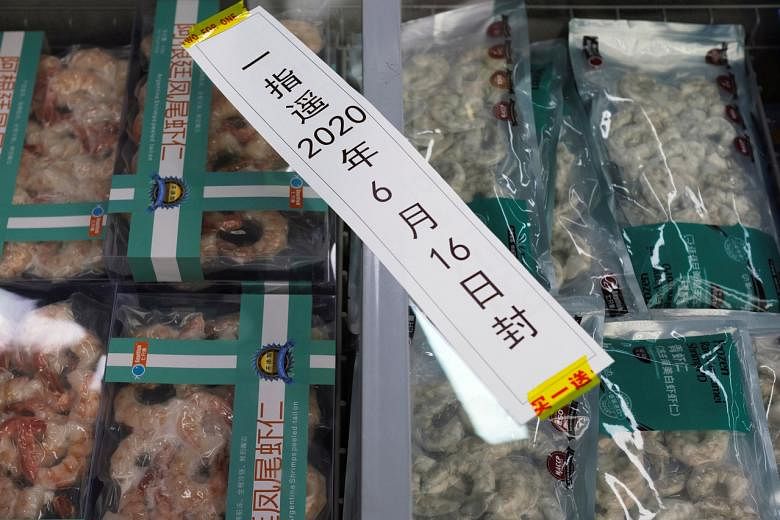BEIJING • China is doubling down on efforts to stem the transmission of the coronavirus through imported cold products, requiring thorough disinfection of such shipments before they come into contact with domestic workers.
The heightened precautions were announced in a notice released by the State Council's Joint Prevention and Control Mechanism on Monday, after Tianjin reported a confirmed case of Covid-19 - a worker at a local frozen food company - on Sunday.
A string of domestic infection clusters this year have been linked to cold-chain imported food.
According to the document, sellers of cold-chain imported food must present disinfection certificates before their products are allowed to enter the market.
In order to reduce disruption to normal logistics and supplies, disinfection should be carried out after nucleic acid samples from overseas products are collected, and should be conducted only once in most cases, it says.
"Disinfection service providers should record their work in detail and the records and paperwork should be kept for at least two years," the document adds.
It also stresses improving the capability of tracing the origin and flow of cold-storage products and investigating and holding shipments from unspecified sources.
"The goal is to be safe, efficient, speedy and economical," it says. "While ensuring the safety of imported cold products, we are also aiming to increase efficiency during customs clearance, avoid backlogs and secure the stability of the industry chain."
Global experts have long suspected the virus' ability to travel and be transmitted through cold-chain products, but evidence has not been easy to nail down.
The Chinese mainland has detected at least 16 cases involving frozen imports testing positive for the presence of the coronavirus since July.
Chinese Customs officials yesterday said they had suspended imports from Indonesia's Anugrah Laut Indonesia for one week, after the virus was detected in a sample of frozen fish products supplied by the company.
Last month, the Chinese Centre for Disease Control and Prevention (CDC) said it had isolated living coronavirus on the outer packaging of frozen food when investigating the source of an outbreak in Qingdao, Shandong province. The discovery, a world first, proved that contact with frozen food packaging contaminated by live virus could cause infection.
Later that month, a Chinese research team consisting of university researchers and CDC experts concluded from epidemiological history and data analysis that the outbreak that took place in Beijing in June was likely to have been triggered by imported seafood, and that cold-chain transportation could be a new route of transmission for the virus.
The confirmed patient in Tianjin is a loading dock worker who handled frozen pork from Germany that arrived in Tianjin on Oct 19. The shipment, part of which was sent to Shandong, tested positive for the virus last Saturday.
The Tianjin government said on Monday evening that it had found a new asymptomatic patient earlier in the day - a truck driver who lugged goods from a frozen storage cluster in the city's Binhai New Area last Thursday.
Tianjin Health Commission deputy director Gu Qing said two areas in the Binhai New Area would be classified as a medium-risk region from midnight on Monday. Other parts of the city remained at low-risk.
CHINA DAILY/ASIA NEWS NETWORK REUTERS











